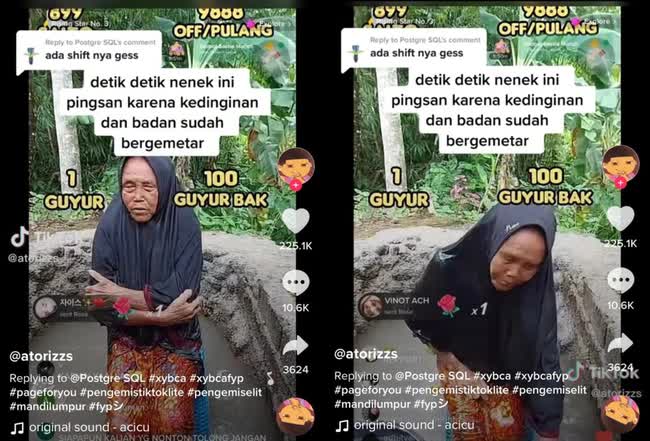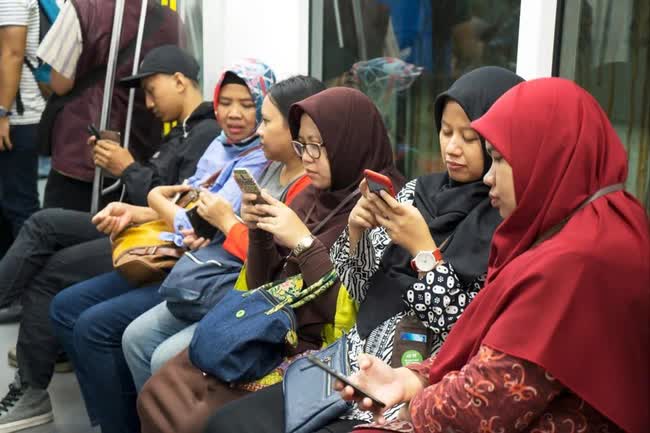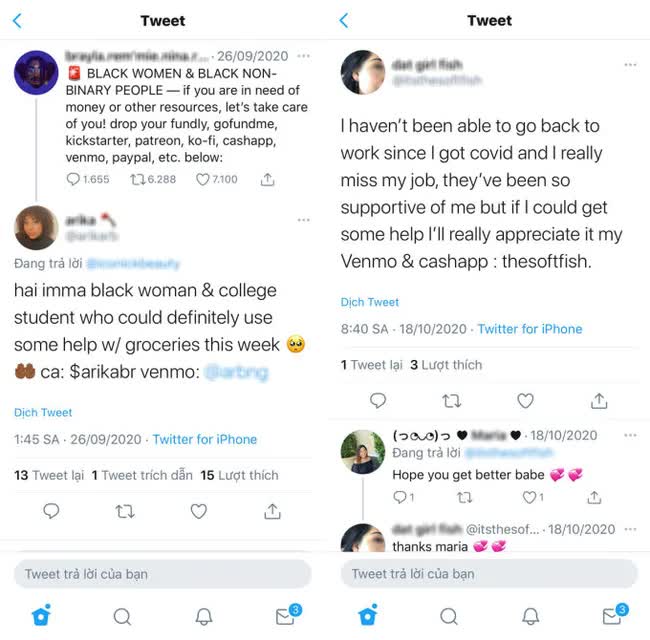When the beggar profession also integrates into Tiktok: Filming a clip of crying and ragged tears to ask for money online, the government urges people to put love in the right place.
- Tram Ho
In early 2023, social media users in Southeast Asia’s largest economy were stunned by the growing number of online beggars who took advantage of the gift-giving features offered by TikTok.
This short video sharing platform allows any account with at least 1,000 followers to record a live stream, and viewers can show appreciation by sending virtual gifts that can be transferred. converted into real money.
Cry on virtual environment for real money
Unlike in real life, where beggars sit for hours in the scorching heat or wander around begging for money, many of the beggars on TikTok, mostly elderly women, pour water. dirty river on people as required in exchange for virtual gifts.
However, when similar videos went viral earlier this month, many people began to question: Are the poor people in the clip doing it voluntarily or being taken advantage of by others?

The image of a citizen bathing in mud was shared on social networks in Indonesia with the purpose of asking for money from internet users
“This woman seems to be forced to do so, poor her,” one TikTok user commented.
In another live stream, several fully clothed women take turns bathing in mud, which was recorded under the account of a man named Sultan Akhyar. This account has been deleted upon request from the Indonesian Ministry of Information and Informatics.
The series of videos quickly faced backlash in a country with more than 99 million TikTok users, the second highest in the world.
On January 19, Sultan said that for the first time, he made a mud bath video with friends to earn some money from followers on TikTok. Neighbors then offered to join “because of poverty and debt”.
Initially, Sultan limited the live stream to 1 hour but then extended it as views increased and gifts arrived. At one point, male TikToker even went live for 24 hours.
Raimin, one of the women in the livestream, said she was not forced to do so because she also wanted to make money.
“I’m poor, I don’t have money to buy necessities, I live alone,” said the 66-year-old, adding that she has done this five times, earning 2 million rupiah ($133) per broadcast.
Another woman in Gowa Regency, South Sulawesi province also made headlines when she tried to earn gifts on TikTok by giving her 7-month-old baby instant coffee instead of milk. The single mother had previously posted a video showing her children eating fried rice and spicy chicken, even though she told police that she was only pretending to do so in front of the camera. Woman working as a waitress at a restaurant. This person’s videos have now been taken down.
Society condemns, the government steps in
Tri Rismaharini, Indonesia’s interior minister, urged the public to report similar videos to local authorities. She also called on employees to stop begging activities, both in real life and on social media, that take advantage of the elderly, children, people with disabilities or other vulnerable groups for profit.
Muhammadiyah, the second largest moderate Muslim group in Indonesia, says that begging and begging for money and free goods degrading people, and this is forbidden in Islam.

The videos hit the viewer’s pity – Illustration: Shutterstock.
Tourism and Creative Economy Minister Sandiaga Uno last weekend urged content creators to create “good content with good values” not to take advantage of the generosity of Indonesians.
The Ministry of Communications and Informatics earlier this week said it had asked TikTok to take down the mud bath videos. Devie Rahmawati, a sociologist at the University of Indonesia, said such videos are likely to continue to spread, as long as “there are people who feel they have done good by directly helping people who eat food.” please online”.
“In the digital world, the way we help others has changed, such as giving gifts, icons or features. These gifts can then be leveraged by the person asking for help,” she said.
Ms. Devie called on the government to educate people to ensure their donations are used for the right purposes.
As for the Sultan, he apologized for the mud bath videos and pledged to create positive content in the future. “I’m willing to delete everything so that others don’t follow. I apologize for posting bad content on my account,” he said.
Previously, in 2020, thanks to the popularity of online payment platforms, the impact of Covid-19 caused online money application to develop in the US.
A college student asks for money to buy groceries, a driver needs money to fix his car, a worker is unemployed because of Covid-19, a single mother needs money to pay for her child’s school fees… All Everyone went to Twitter to ask. Not thousands of dollars, they only ask for a few dollars. This is the amount of change that people on social media can easily give, thanks to the popularity of electronic payment platforms.
This process is very simple. Someone posts a social media post about their financial need with details about a commonly used peer-to-peer payment platform, including: Name, account number or link. Then ask your friends to share the post. With just a few clicks, a stranger can stumble across a post and complete a “call for help” money donation. In this case, the money is transferred directly from the person to the beggar – a modern, fast, new type of “begging”.

Online begging is increasingly popular on US social networks, thanks in part to the growth of electronic payment platforms.
In order to get more attention, these help-seeking posts are shared on various channels to “increase the signal”. Cross-platform “share”, “like”, “repost” and “publish” buttons have created more potential for online begging. Individual philanthropists are the stronghold of a new kind of “begging trend”.
“More and more people are asking for money on Twitter, TikTok and Instagram through online payment platforms, like PayPal, Venmo, Cash App and Zelle,” said Jenna Drenten, a sociology researcher at Loyola University in Chicago. . This is completely different from donating from the community. It’s not an online fundraising event, but it’s not a form of debt collection either. It’s begging online.
Online begging causes many people living on wages to switch to living on begging money. In a way, the proliferation of begging models on social networks can change the “poor beggar” mindset. It also changes more or less the moral myths surrounding poverty.
In the US, asking for money from strangers has long been stigmatized. The “American Dream” is built on a strong belief that anyone with courage can work hard to survive. The implicit individualism asserts that if you can’t do something, it’s your own fault. If you need help, you must turn to the benevolence of organizations or families.
Source : Genk
